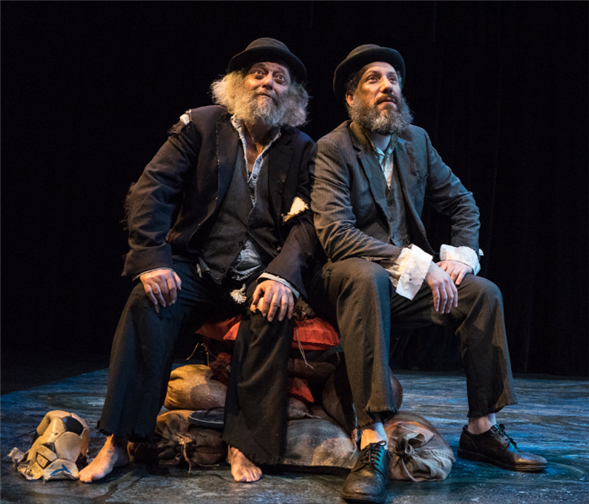Translate Page

How New Yiddish Rep's production evokes the refugee crises of the present and past
---
Samuel Beckett wrote Waiting for Godot in French before reimagining it in English. Since its 1953 premiere, the absurdist masterpiece about two down-on-their-luck characters stuck in limbo has been presented in myriad languages and contexts. But something fresh is found in translation with New Yiddish Rep's production, currently running at the 14th Street Y. Performed in Yiddish with English supertitles, Vartn af Godot uses the expressive tongue to heighten its emotional resonance. Yiddish is known for its uncanny ability to ping-pong between funny and depressing, which makes it the ideal language for this venerable tragicomedy.
New Yiddish Rep -- which is dedicated to keeping Yiddish theatre alive via modern treatments of Yiddish classics and Yiddish interpretations of classic plays -- previously mounted Waiting for Godot in 2013. However, save for artistic director David Mandelbaum reprising his performance as Estragon, this is a different cast in a totally new production that speaks to today's refugee crisis. "It's not a refugee crisis; it's a refugee fact," clarifies director Ronit Muszkatblit, a Germany-born, Israel-bred artist who's called New York City home for the past two decades. "For a whole new generation of humans, it's the only existence they know, never having a home. Life for refugees is always waiting -- for a paper to be signed, for a boat to land, for somebody to arrive. You wait and you have no control over your destiny. That's what makes Godot so relevant to this moment."
{Image1}
Waiting for Godot also grapples with the limitations of language, and how challenging it can be to communicate with others. Performing in Yiddish, which most audiences cannot understand, underscores this idea, and also echoes what happened in the rehearsal room. "We switched on and off, in Hebrew, English and Yiddish," says Muszkatblit, who admits she's not fluent in the latter, but that she's getting better. "It's the same way I grew up because my dad didn't speak Hebrew. He spoke German and Yiddish. And I went to a British school. So it's very natural to me to move between languages and to have to translate."
For a purportedly dying language, Yiddish is enjoying quite the resurgence on the New York stage. The century-old National Yiddish Theatre Folksbiene's critically acclaimed production of Fiddler on the Roof is transferring Off-Broadway next month, New Yiddish Rep is celebrating its 12th season of producing plays and the weeklong Yiddish New York festival just wrapped up at the 14th Street Y, where Muszkatblit serves as the director of arts + culture as well as the artistic director of LABA: A Laboratory for Jewish Culture, which uses classic Jewish texts to inspire the creation of new work.
Although New Yiddish Rep's Godot isn't part of that initiative, LABA indirectly helped make it happen. Muszkatblit originally met Mandelbaum when he attended a LABA show a few years back, which led to him inviting her to direct The Labor of Life for New Yiddish Rep. Godot is her second collaboration with the company.
{Image2}
Muszkatblit says that she and Mandelbaum were "on the same page from the very beginning" about this production addressing the plight of displaced people. And while it will certainly make audiences think of what's going on in Europe and at the U.S.-Mexico border, it also recalls centuries of Jewish diaspora.
Just hearing the dialogue in Yiddish "evokes empathy and your memories of your ancestors, of their life and their journey," says Muszkatblit. "The play is so deep and philosophical that it can address whatever is going on in any iteration you make it. Horrible things are happening all around us, and it's a reflection of, what are we waiting for? Who are we waiting for? Godot is so existential, I know it in my DNA."
---
TDF MEMBERS: At press time, discount tickets were available for New Yiddish Rep's Waiting for Godot. Go here to browse our current offers.
Raven Snook is the Editor of TDF Stages. Follow her at @RavenSnook. Follow TDF at @TDFNYC.
Top image: David Mandelbaum and Eli Rosen in Waiting for Godot / Vartn Af Godot. Photo by Dina Raketa.